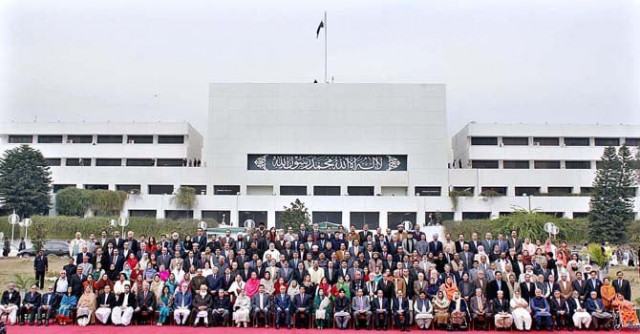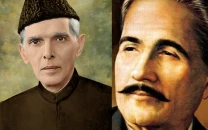History made: One giant leap for democracy
Consensus reached on concurrent polls; deadlock persists over dissolution of provincial assemblies.

Group photo of the National Assembly of Pakistan upon completion of their five year term. PHOTO: APP/FILE
As politicians basked in the afterglow of rare, democratic pride on Saturday night, news of the official dissolution of the country’s first full term National Assembly was greeted with muted celebrations. In the end, it was the 13th National Assembly that broke the jinx of interrupted governments. None of the previous 12 lower houses of parliament survived a full term in office.
This time, all centres of power seem mindful that the country’s first proper transition since 1947 will come to naught if power is not transferred to an elected successor. Even as this realisation sinks in deeper within the polity, intrigues appear to have continued over the interim set-up in the centre and the provinces.
While all four chief ministers, in a meeting with outgoing Prime Minister Raja Pervaiz Ashraf, have agreed in principle to hold the elections for all assemblies on the same day, they failed to reach consensus on when the provincial assemblies – whose terms expire on separate dates – will be dissolved.
“As proposed by the prime minister, the chief ministers have agreed in principle that the elections of the national and provincial assemblies will be held on the same day for logistical, administrative and financial reasons, and to promote political harmony in the country,” read a statement by the prime minister’s office following the meeting on Saturday.
The move was confirmed by Punjab Chief Minister Shahbaz Sharif as well.
The dissolution of the 13th National Assembly was pronounced through a notification under Articles 52 which reads: “The National Assembly shall, unless sooner dissolved, continue for a term of five years from the day of its first meeting and shall stand dissolved at the expiration of its term.”
With the term of 342-member National Assembly over as of March 16, the federal cabinet too stood dissolved. A separate notification was issued by the Cabinet Division in this regard.
Parliament Speaker Dr Fehmida Mirza, however, will continue to hold her office till the 14th National Assembly will elect a new custodian of the lower house of Parliament. Prime Minister Ashraf too will continue in office until the interim prime minister takes charge.
Although, both the government and opposition have publicly rejected two names proposed by either side for interim prime minister, it has been learnt that there is a broader understanding between the ruling Pakistan Peoples Party and the main opposition Pakistan Muslim League-Nawaz. The opposition may agree to a mutually-acceptable candidate nominated by PPP for interim premier if the ruling party will repay the favour in Punjab, which the PML-N rules.

During an earlier interaction with leader of opposition in the NA Chaudhry Nisar Ali Khan and the Punjab chief minister, Prime Minister Ashraf emphasised Dr Ishrat Hussain’s name among nominees for interim premier. The PML-N, meanwhile, has placed Justice (retd) Nasir Aslam Zahid on the top of its list of nominees.
Despite this, political manoeuvring by the country’s major political parties has hindered the smooth transition to interim set-ups in the provinces. Apart from Khyber-Pakhtunkhwa, the names of caretaker chief executives for the other three provinces have yet to be decided. No clear picture has emerged regarding the dissolution of provincial assemblies.
The PML-N has linked the dissolution of the Punjab Assembly with having a say in the interim set-up in Sindh and Balochistan.
“We will not agree if any caretaker chief minister is installed in Sindh and Balochistan under a covert deal,” Shahbaz Sharif told reporters before leaving for Lahore after a tête-à-tête with PM Ashraf.
The five-year term of the Punjab Assembly is set to expire last, on April 12. The provincial government will continue till then if the assembly is not dissolved before that.
Meanwhile, amid ongoing constitutional crisis in Balochistan – where governor’s rule expired two days ago – restored Chief Minister Nawab Aslam Raisani has refused to agree to a date for the provincial assembly’s dissolution unless the PPP leadership concedes to his demands. Key among them is a demand for changing the Balochistan chief secretary.
In Sindh, the Muttahida Qaumi Movement is negotiating the interim set-up with Chief Minister Qaim Ali Shah, a PPP leader.
The PML-N, however, has demanded that its allies Pakistan Muslim League-Functional and other nationalist parties be consulted before an interim chief minister is installed.
In case provincial assemblies are not dissolved before the end of this month, it will be impossible to hold general elections for national and provincial legislatures on the same day. The NA elections have to take place within 60 days of its dissolution. The election schedule for provincial legislatures requires a minimum 45 days and will not fit the 60-day deadline for the NA polls.
There are still three days left for negotiations between Chaudhry Nisar and PM Ashraf, before they will have to refer the names of two candidates to a parliamentary panel. In case a stalemate continues, a new name can be added from both sides till the matter goes to the parliamentary committee by Wednesday.
Published in The Express Tribune, March 17th, 2013.



















COMMENTS
Comments are moderated and generally will be posted if they are on-topic and not abusive.
For more information, please see our Comments FAQ